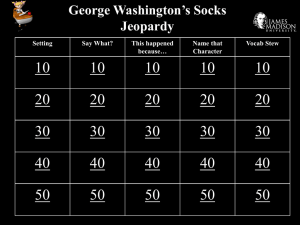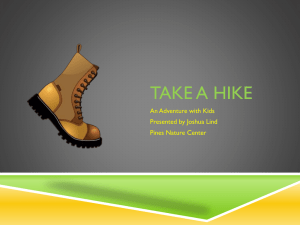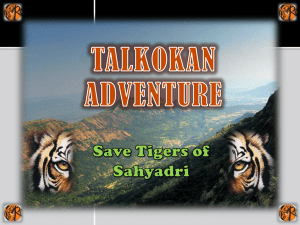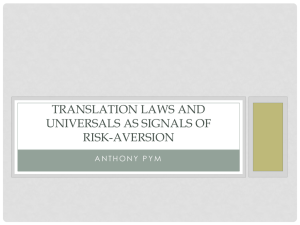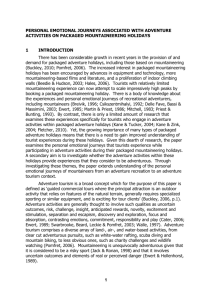Personal emotional journeys associated with adventure activities on
advertisement
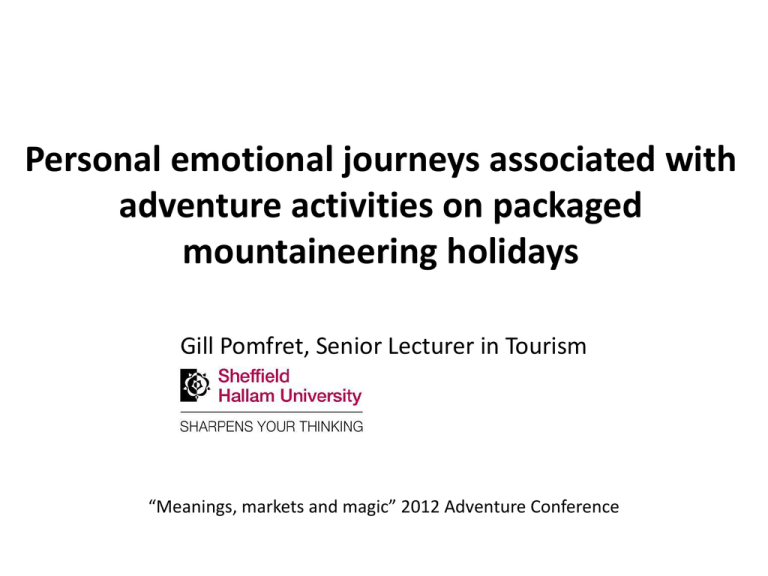
Personal emotional journeys associated with adventure activities on packaged mountaineering holidays Gill Pomfret, Senior Lecturer in Tourism “Meanings, markets and magic” 2012 Adventure Conference Presentation themes • Research context & questions • Previous work on emotional journeys of adventure participants • Fieldwork research in Chamonix, French Alps • Key findings perceptions of risk contrasting emotions “other world” feelings • Conclusion Research Context • Growing interest in experiences of adventure tourists • Growth in packaged adventure holidays & adventure tourists • Limited research on experiences of tourists on packaged adventure holidays • Considerable understanding of experiences of recreational mountaineers Research Context • All consuming & challenging nature of adventure • Conflicting emotions within the adventure experience • Emotional journeys during adventure activity participation • Emotional journeys during packaged adventure activity participation Research questions • To investigate the character of the emotional journeys of tourists associated with adventure activities engaged in as part of their packaged mountaineering holidays. • To evaluate whether the adventure activities within these holidays provide experiences that tourists consider to be adventurous. Emotional journeys of adventure participants Risk taking • Risk is integral to the adventure experience (Ewert, 1985; Martin & Priest, 1986; Robinson, 1992) • Risk is a non-essential, secondary ingredient of adventure (Kane & Tucker, 2004; Varley, 2006; Walle, 1997) • Differing perceptions of risk held by adventure activity participants Emotional journeys of adventure participants Contrasting emotions • Waves of ‘terror and elation, joy and despair, anxiety and pleasure …’ (Swarbrooke et al, 2003, p.14) • Flow & adventure ‘A sense of exhilaration, a deep sense of enjoyment that is long cherished and that becomes a landmark in memory for what life should be like’ (Csikszentmihalyi, 1992, p.3). The challenge-skills dimension Emotional journeys of adventure participants “Other world” feelings • ‘The ordinary world and everyday concerns are left behind’ (Swarbrooke et al, 2003, p.113) • Adventure’s core elements & flow dimensions • Influence of the natural environment (Curtin, 2009; Frederickson & Anderson, 1999; Vespestad & Lindberg, 2011) Fieldwork research • Qualitative approach • Data collection in Chamonix region tourists on packaged mountaineering holidays • 38 semi-structured interviews carried out during or at end of holiday • Respondent profile Findings - perceptions of risk Not feeling “at risk” • Lack of risk perceived during mountaineering participation • Guide’s role in packaged adventure activity experiences (Kane & Tucker, 2004; Fletcher, 2010) • The importance of challenge to respondents’ experiences ‘The course allows for more challenges in a safer environment because you’ve always got the guide there with you. It’s a totally different experience with a guide. On your own, you need more selfreliance so you have to think for yourself more.’ Findings - perceptions of risk ‘I had a big backpack on while walking down these foot wide paths with a drop off, and I found that although it wasn’t technically challenging, that’s where the adrenalin maybe flowed the most for me because I got the feeling of “if you slip, you’re going to die”.’ Feeling “at risk” • Did respondents face truly hazardous situations? • Mountaineering organisations cannot pledge 100% safety for their clients Findings - contrasting emotions • Intense emotional peaks & troughs ranged from feelings of abject misery to total euphoria • Experiences of flow or a flow-like state perceived positive challenge-skill balance the ultimate reward for many respondents Findings - contrasting emotions ‘There were all these different points when I thought “I’m not really convinced I’m going to be able to do this”. … We got to the top and we were completely exhausted and we still had 10km to get back down again. … The top was awesome! It was absolutely exhilarating and we’d been building up to it for two and a half years.’ Findings - contrasting emotions • Pushing beyond the “comfort zone” • Participants in commodified adventure activities ‘play with their fears’ (Cater, 2006, p.321). • Felt safe in the presence of the guide ‘It was a challenge on the ridge climb as there were often sheer drops on either side and I have a fear of heights! Part of the challenge was to see if I could just deal with it. I had to push myself mentally to do things out of my comfort zone, but I did it and I felt on a real high afterwards.’ Findings - contrasting emotions • Experiences of flow or flowlike states both during & after completing mountaineering activities ‘It was just a horrible slog and you’re cold and trying to keep warm, and the way the altitude affects your brain, you don’t seem to think properly. … Once I reached the top, I felt great but I still had to get down. It was only later that I felt a deep satisfaction which I find hard to achieve any other way.’ Findings - “other world” feelings ‘in a zone’ ‘in a trance’ ‘on a different planet’ • Presence of flow dimensions action-awareness merging concentration on the task in hand transformation of time (Jackson & Csikszentmihalyi, 1999) ‘You are in an altered state anyway because of the altitude. I had nothing else to worry about. … It was just one activity that was happening at one point in time. ... You’ve got to completely concentrate on what you are doing, otherwise things might go wrong.’ Findings – “other world” feelings • Influence of the natural mountain environment euphoric feelings less demanding activities • Natural environment induces emotionally charged “highs” (Curtin, 2009; Frederickson & Anderson, 1999; Vespestad & Lindberg, 2011) ‘When we were walking through the trees, every so often we’d get a great view and I just kept thinking “oh, it’s brilliant to be here.” … When I watched the sun go down it made me feel like I was on top of the world.’ Conclusion • Character of the emotional journeys of tourists on packaged mountaineering holidays: Perceived risk not integral to emotional journeys Intense emotional peaks and troughs “Other world” feelings • Do the adventure activities within these holidays provide experiences that tourists consider to be adventurous? Genuine adventures experienced yet tourists were not exposed to completely unadulterated adventure References • • • • • • • • • • • • • • Cater, C. (2006) "Playing With Risk? Participant Perceptions of Risk and Management Implications in Adventure Tourism." Tourism Management, 27(2), 317-325. Csikszentmihalyi, M. (1992) The Psychology of Happiness. Rider. Curtin, S. (2009) Wildlife tourism: the intangible, psychological benefits of human-wildlife encounters. Current Issues in Tourism, 5-6, 451-474. Ewert, A. (1985) "Why People Climb: the Relationship of Participant Motives and Experience Level to Mountaineering." Journal of Leisure Research, 17(3), 241-250. Fletcher, R. (2010) "The Emperor's New Adventure: Public Secrecy and the Paradox of Adventure Tourism." Journal of Contemporary Ethnography, 39(1), 6-33. Fredrickson, L. and Anderson, D. (1999) "A Qualitative Exploration of the Wilderness Experience as a Source of Spiritual Inspiration." Journal of Environmental Psychology, 19, 21-29. Jackson, S.A. and Csikszentmihalyi, M. (1999) Flow in Sports: The Keys to Optimal Experience and Performances. Kane, M. J. and Tucker, H. (2004) "Adventure Tourism: the Freedom to Play with Reality." Tourist Studies, 4(3), 217-234. Martin, P. and Priest, S. (1986) "Understanding the Adventure Experience." Adventure Education, 3, 18-21. Robinson, D.W. (1992) "A Descriptive Model of Enduring Risk Recreation Involvement." Journal of Leisure Research, 24(1), 52-63. Swarbrooke, J., Beard, C., Leckie, S. and Pomfret, G. (2003) Adventure Tourism: The New Frontier. ButterworthHeinemann. Varley, P. (2006) "Confecting Adventure and Playing with Meaning: the Adventure Commodification Continuum." Journal of Sport and Tourism, 11(2), 173-194. Vespestad, M.K. and Lindberg, F. (2011) Understanding nature-based tourist experiences: an ontological analysis. Current Issues in Tourism, 14(6), 563-580. Walle, A.H. (1997) "Pursuing Risk or Insight: Marketing Adventures." Annals of Tourism Research, 24(2), 265282.
